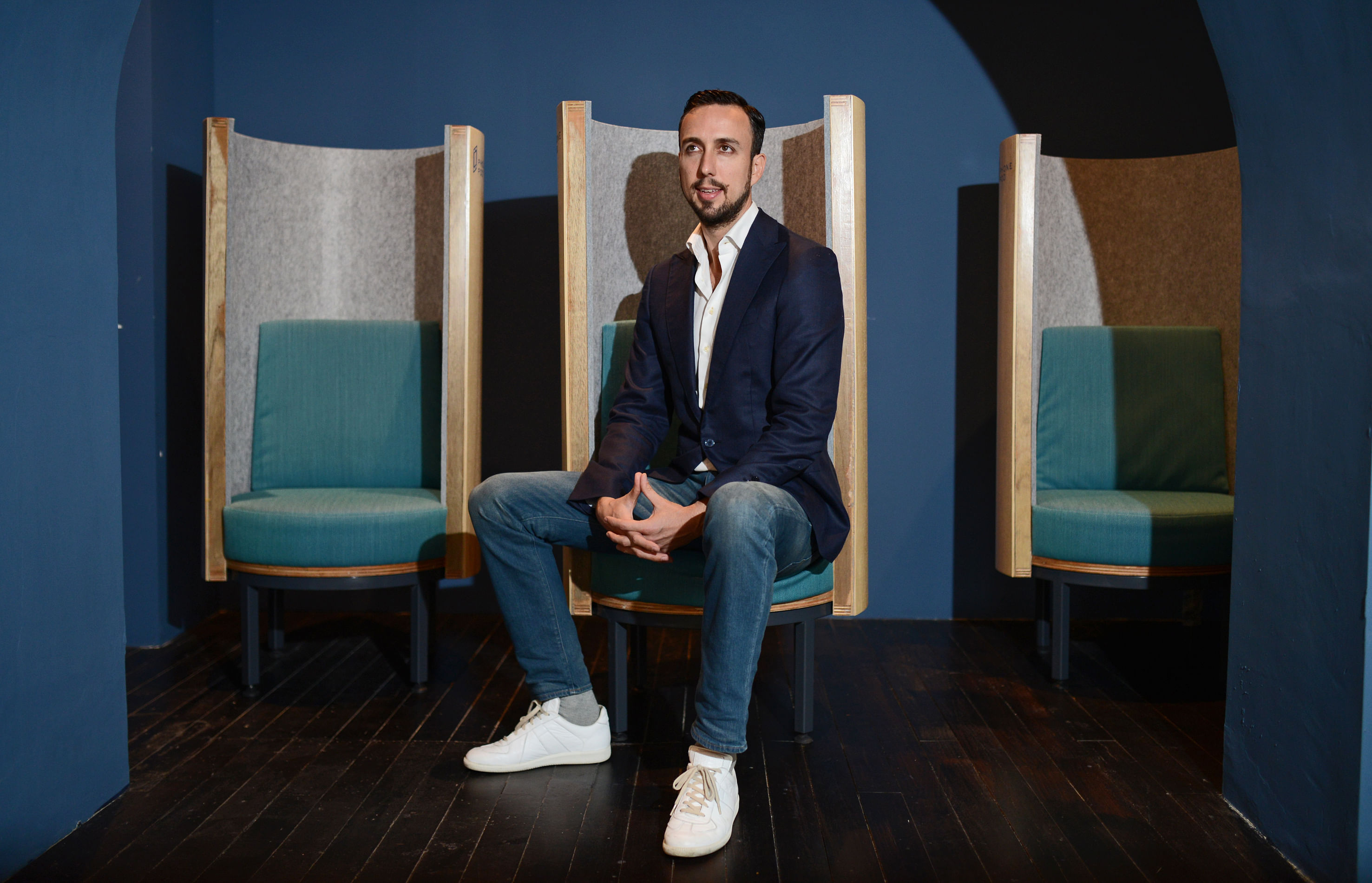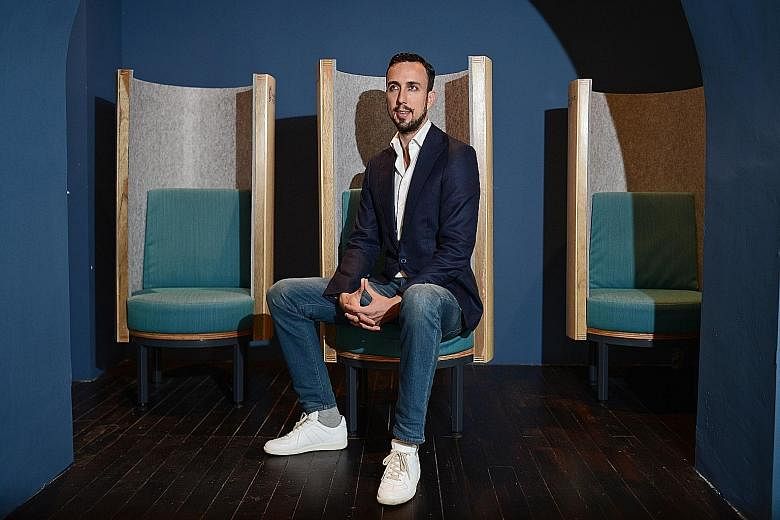With his last name, it's no wonder people chuckle when they learn that entrepreneur Dominic Gamble used to chance his arm on the financial markets.
The Singapore-based Briton still gets teased about his last name, but says his "punting" days are over.
Mr Gamble, 35, used to savour the thrill of trading in his 20s, but the "fairly boring" investor's biggest gamble was the day he left his high-flying banking career to start his own business.
He made his move after 12 years in the finance game, including private banking stints with blue-chip firms like Credit Suisse and Deutsche Bank, when he saw the chaos of the 2008 financial crisis up close.
"One of the big issues in 2008 was the gambling mentality. You've got a client base that want to be actively involved, follow returns and are not experts, not understanding their risk profile," he says.
"You had bankers feeding that, saying here's a 10-per-cent-return product. The combination of the two is an absolute recipe for disaster."
The banking industry has taken many steps to improve those issues, but educating clients will still take a while, he notes.
The aim of wanting to help people team up with the right professionals led Mr Gamble and a former client to set up findawealthmanager.com in Britain in 2012, with an initial investment of $1 million.
Their firm matches wealthy individuals, with at least US$250,000 (S$355,500) to invest, with wealth managers through a proprietary algorithm.
He saw the potential of wealth management in fast-growing Asia and moved here early last year with his wife Caroline, 34, and two-year-old daughter Siva.
Their baby boy Rumi was born just two weeks ago.
-
Worst and best bets
-
Q What has been your biggest investing mistake?
A Taking far too much risk. I didn't necessarily understand the risks that I was taking. It's only when I looked at a list of losses, that I started to cobble together the risks involved.
If you understand the risks you're prepared to take and how much you're prepared to lose, you build your portfolio around that, not the other way round, looking for investments first.
That's what I did as a private banker for my clients and, now, for my own money.
Unfortunately, it's not as exciting and the excitement can quickly turn into fear with the losses.
I was investing a lot in my 20s, I made money through work, was doing well and started my portfolio. I was trading every day, and doing all sorts of weird, wonderful things such as derivatives, all from my iPad. It's lots of fun, until you start to lose lots of money. In my 20s, I probably lost 80 per cent of my savings.
And it was dangerous. For many, but not everyone, it's tantamount to going to the casino.
Q And what has been your best investment move?
A I have been lucky to buy a family property in London, a share of a freehold 1, 000 sq ft apartment in Notting Hill. I'm not a huge property investor, but it's the best investment in terms of how it gave my wife and I stability when we were having our first child.
Financially, it's been pretty good too but I don't assign much skill to that. At my age, I am more interested in capital gain than yield. Fortunately, the market has been strong and the price has doubled.
It's rented now but the rental market is awful, with a 2 per cent yield. I see the merit of having some property exposure, but most people are far too obsessed with property.
These days, my best investment is delegation - delegating my wealth affairs, administration, and accounting.
Why? It gives me more time. I'm extremely time-poor, I would rather spend my precious downtime enjoying my life, not managing my financial affairs on my own.
Rachael Boon
The portal in Singapore went live in June and gets about 5,000 unique visits a month.
It takes about three to four months for clients to choose the right manager, so the first few clients have just started their working relationship.
Mr Gamble believes in getting professionals to help, not just in his family's wealth management, but also in wills and insurance, financial planning for his family, and retirement. "If you've got a good professional partner, whether it's a wealth manager, accountant or even a builder, that's a great investment. Time is one of our biggest commodities," said Mr Gamble.
"We'd look back in 20 years and go, 'where has the time gone?'
"And you've got to have something to show for it, whether it's family or friends-related, and whether it's business-related."
Mr Gamble has not looked back since he left private banking, and is enjoying the journey.
"I believe if you're not excited about working, it's a recipe for a sad existence. We all work to make money to survive, but you've got to have fun doing it.
"It's a big world, there are lots of things you can do, and it's not all about making the most money but the most enjoyment, and that will give you the fuller life."
Q Moneywise, what were your growing-up years like?
A Being entrepreneurial is in my DNA. From a very young age, I had to work for my pocket money.
At 14, I was doing paper rounds, then retail at 16, working in shops.
Then I got into business and started importing computers from Hong Kong when I was 18.
At university, I was doing party promotions and getting sponsors for parties, so it was quite a shock when I walked into a bank on my first day and there were thousands of people in this building.
It was a shock to me how business was done, and I grappled with that for the next 12 years of my career.
I always wanted to start my own business but I was successful at my job. It's different when you work for somebody else, where there's a bit less stress as compared with working for yourself.
Q How did you get interested in investing?
A I had an internship when I was 16 that was arranged by my school, in investment banking.
It was at the foreign exchange trading floor of a French bank.
I walked in on my first day and I never had so much fun.
I did nothing, I just sat there.
But I couldn't believe some of the things I was seeing, like the energy in the room.
From that day on, I started to read Financial Times.

I didn't understand most of it but I started to read it. I chose to study economics in school and then accounting and finance at university.
I did another internship at the same bank while I was at university, and they offered me a job when I was 21.
It really captivated me.
The minute I lost that excitement was the minute I wanted to start my own business at 32.
Q Describe your investing strategy.
A It's hands-off and long-term.
My personal investing style has changed tremendously over the years. When I started my career in markets, it was exciting to be trading investments and "punting".
I had a short-term outlook.
Now I am the opposite.
I have been late to realise the importance of a boring, long-term approach and that has cost me a lot of money.
My profile as a 35-year-old is more risky than that of a 65-year-old, so I'm not really interested in income but capital growth, and I have risk appetite.
It's getting less risky as the years go by.
But I don't want to follow the markets in and out, so I leave those decisions to be made by a third-party professional, the wealth manager.
I'm very happy with a 5 per cent return. If you get 10 per cent, that's great.
(I believe in) the power of saving and - as Albert Einstein said - compound interest, which is the eighth wonder of the world.
If you invest regularly, you can make so much more money in the long term than having no structure in investing.
Q What's in your portfolio?
A I prefer to invest in Singapore-listed equities, some Singdollar-denominated fixed income and some alternative investments.
I don't stock pick, but my wealth manager is overweight on emerging markets and is conservative sector-wise.
This includes telecommunications, banks and pharmaceuticals.
On average, the portfolio earns about 7 per cent a year.
I'm very happy with that.
I've some legacy hedge fund and private equity exposure from my misspent youth, which have been very hit-and-miss.
I was very keen on alternative exposure, but some have done well, some have not.
But you must be aware it can be illiquid. I see it as something for the longer term but at this stage in my life, it doesn't fit in.
I do keep a firm handle on fees because that can really erode performance over time.
I like exchange-traded funds and those feature heavily in my portfolio. They are a cost-effective way to gain focused exposure without getting granular on stocks.
Above all, my business is a Singapore company.
That is my main asset.
Q What does money mean to you?
A Lifestyle and financial security for the future, so that when I'm not working, I can live the life I want to.
It's really fun to go out for a great dinner.
It's a great experience to travel to a new country for a holiday, to experience a new culture.
But future financial security has to be at the back of your mind and preparing for that can never be too soon.
Money is not about possessions. I don't like them, I've very few.
Q What's the most extravagant thing you have done?
A Starting my own business.
It's not a financial extravagance, it's about that luxury of being my own boss.
And, like every extravagance, it comes with some downside. I've sacrificed a steady career and got into something way more - hopefully way more - lucrative, and volatile.
Every day has been different.
I invested all my liquid wealth into my business. We broke even in our first year and have never looked back. Business revenues are strong for a business of our size, not quite at a million (dollars) yet.
Q What has been one of your biggest regrets when it comes to investing?
A Taking stock tips from friends all the way down to taxi drivers - one of the cardinal sins of investing.
The worst was an uranium miner that was a "sure thing" that went bankrupt, causing a 100 per cent loss. I had no understanding in the real underlying company and sector. Lessons learnt.
If it's backed by research, I've got no issues, but a professional is not going to give you a stock tip that's going to treble in a month. No way, it's not the way to run a portfolio.
Q What are your immediate investment plans?
A I just put money away every month, it's not much but it all adds up. Any surplus goes into the business which, at this stage of my life, is a good investment.
Q How are you planning for retirement?
A I'm planning to have a beautiful home on a big piece of land, growing fruit and vegetables, living outdoors with lots of little hobbies. I'm really interested in food, not just eating, but cooking and growing.
I also play a lot of sport and would love to be outdoors in my garden that I designed, but my first project would be to build that house.
I want to build our own home, with some help.
Q Home is now...
A A condo in Tanglin. I'm not in the (Channel 5) TV show yet though (laughs).


